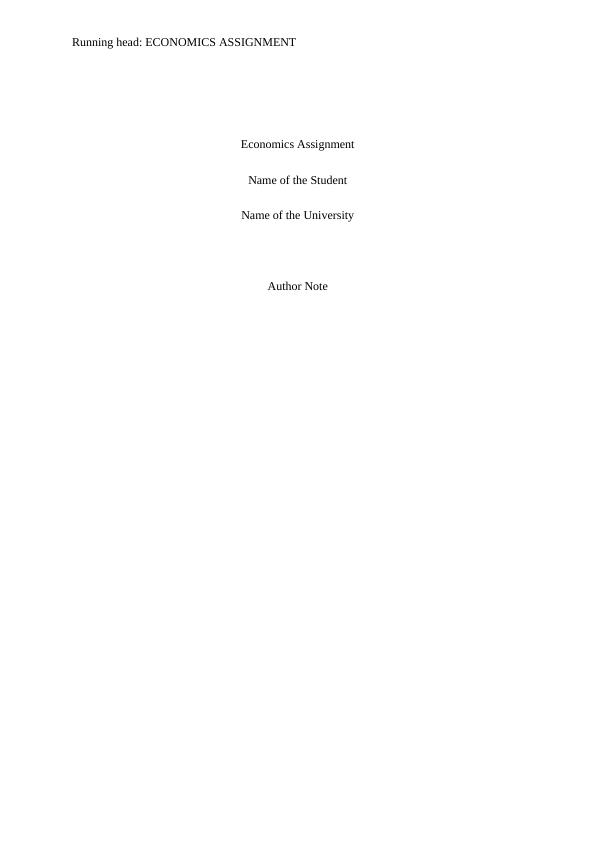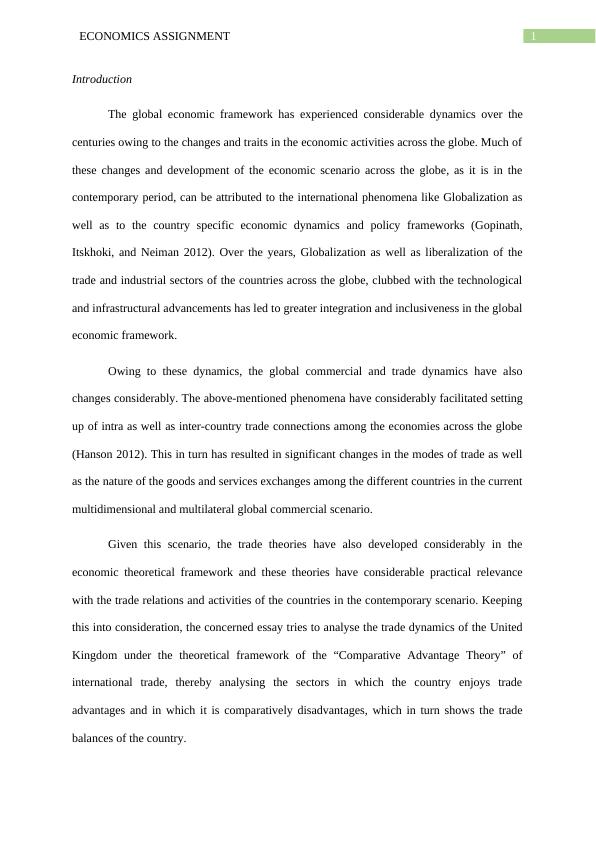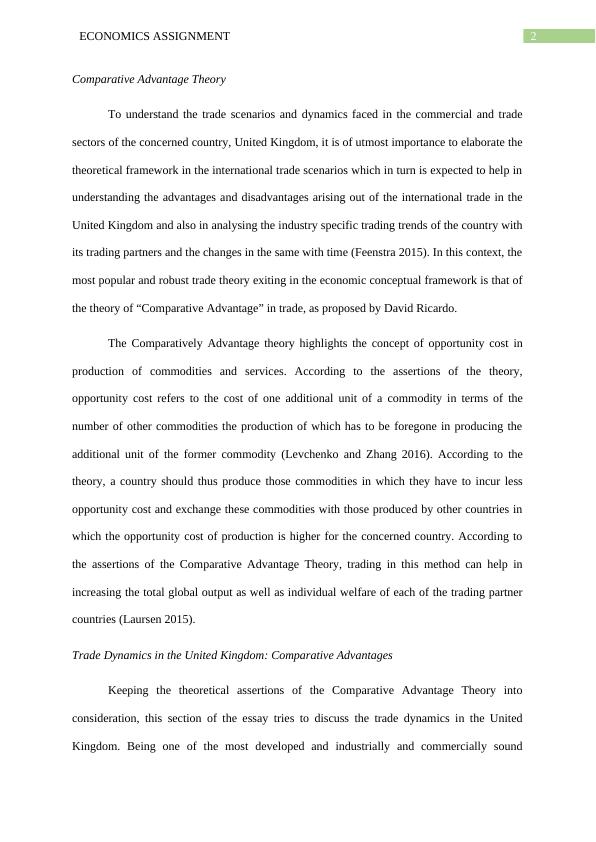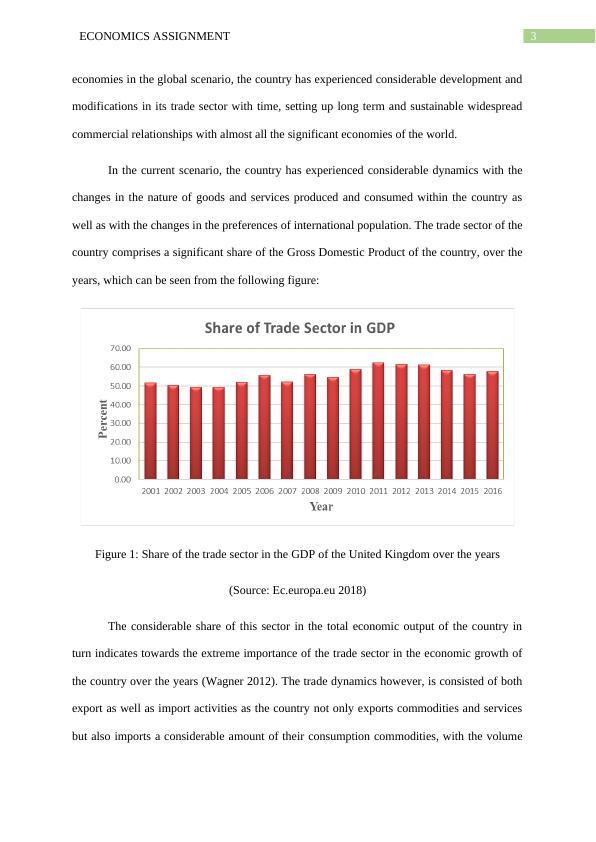Analyzing Trade Dynamics of United Kingdom under Comparative Advantage Theory
Added on 2023-06-14
13 Pages2269 Words461 Views
Running head: ECONOMICS ASSIGNMENT
Economics Assignment
Name of the Student
Name of the University
Author Note
Economics Assignment
Name of the Student
Name of the University
Author Note

1ECONOMICS ASSIGNMENT
Introduction
The global economic framework has experienced considerable dynamics over the
centuries owing to the changes and traits in the economic activities across the globe. Much of
these changes and development of the economic scenario across the globe, as it is in the
contemporary period, can be attributed to the international phenomena like Globalization as
well as to the country specific economic dynamics and policy frameworks (Gopinath,
Itskhoki, and Neiman 2012). Over the years, Globalization as well as liberalization of the
trade and industrial sectors of the countries across the globe, clubbed with the technological
and infrastructural advancements has led to greater integration and inclusiveness in the global
economic framework.
Owing to these dynamics, the global commercial and trade dynamics have also
changes considerably. The above-mentioned phenomena have considerably facilitated setting
up of intra as well as inter-country trade connections among the economies across the globe
(Hanson 2012). This in turn has resulted in significant changes in the modes of trade as well
as the nature of the goods and services exchanges among the different countries in the current
multidimensional and multilateral global commercial scenario.
Given this scenario, the trade theories have also developed considerably in the
economic theoretical framework and these theories have considerable practical relevance
with the trade relations and activities of the countries in the contemporary scenario. Keeping
this into consideration, the concerned essay tries to analyse the trade dynamics of the United
Kingdom under the theoretical framework of the “Comparative Advantage Theory” of
international trade, thereby analysing the sectors in which the country enjoys trade
advantages and in which it is comparatively disadvantages, which in turn shows the trade
balances of the country.
Introduction
The global economic framework has experienced considerable dynamics over the
centuries owing to the changes and traits in the economic activities across the globe. Much of
these changes and development of the economic scenario across the globe, as it is in the
contemporary period, can be attributed to the international phenomena like Globalization as
well as to the country specific economic dynamics and policy frameworks (Gopinath,
Itskhoki, and Neiman 2012). Over the years, Globalization as well as liberalization of the
trade and industrial sectors of the countries across the globe, clubbed with the technological
and infrastructural advancements has led to greater integration and inclusiveness in the global
economic framework.
Owing to these dynamics, the global commercial and trade dynamics have also
changes considerably. The above-mentioned phenomena have considerably facilitated setting
up of intra as well as inter-country trade connections among the economies across the globe
(Hanson 2012). This in turn has resulted in significant changes in the modes of trade as well
as the nature of the goods and services exchanges among the different countries in the current
multidimensional and multilateral global commercial scenario.
Given this scenario, the trade theories have also developed considerably in the
economic theoretical framework and these theories have considerable practical relevance
with the trade relations and activities of the countries in the contemporary scenario. Keeping
this into consideration, the concerned essay tries to analyse the trade dynamics of the United
Kingdom under the theoretical framework of the “Comparative Advantage Theory” of
international trade, thereby analysing the sectors in which the country enjoys trade
advantages and in which it is comparatively disadvantages, which in turn shows the trade
balances of the country.

2ECONOMICS ASSIGNMENT
Comparative Advantage Theory
To understand the trade scenarios and dynamics faced in the commercial and trade
sectors of the concerned country, United Kingdom, it is of utmost importance to elaborate the
theoretical framework in the international trade scenarios which in turn is expected to help in
understanding the advantages and disadvantages arising out of the international trade in the
United Kingdom and also in analysing the industry specific trading trends of the country with
its trading partners and the changes in the same with time (Feenstra 2015). In this context, the
most popular and robust trade theory exiting in the economic conceptual framework is that of
the theory of “Comparative Advantage” in trade, as proposed by David Ricardo.
The Comparatively Advantage theory highlights the concept of opportunity cost in
production of commodities and services. According to the assertions of the theory,
opportunity cost refers to the cost of one additional unit of a commodity in terms of the
number of other commodities the production of which has to be foregone in producing the
additional unit of the former commodity (Levchenko and Zhang 2016). According to the
theory, a country should thus produce those commodities in which they have to incur less
opportunity cost and exchange these commodities with those produced by other countries in
which the opportunity cost of production is higher for the concerned country. According to
the assertions of the Comparative Advantage Theory, trading in this method can help in
increasing the total global output as well as individual welfare of each of the trading partner
countries (Laursen 2015).
Trade Dynamics in the United Kingdom: Comparative Advantages
Keeping the theoretical assertions of the Comparative Advantage Theory into
consideration, this section of the essay tries to discuss the trade dynamics in the United
Kingdom. Being one of the most developed and industrially and commercially sound
Comparative Advantage Theory
To understand the trade scenarios and dynamics faced in the commercial and trade
sectors of the concerned country, United Kingdom, it is of utmost importance to elaborate the
theoretical framework in the international trade scenarios which in turn is expected to help in
understanding the advantages and disadvantages arising out of the international trade in the
United Kingdom and also in analysing the industry specific trading trends of the country with
its trading partners and the changes in the same with time (Feenstra 2015). In this context, the
most popular and robust trade theory exiting in the economic conceptual framework is that of
the theory of “Comparative Advantage” in trade, as proposed by David Ricardo.
The Comparatively Advantage theory highlights the concept of opportunity cost in
production of commodities and services. According to the assertions of the theory,
opportunity cost refers to the cost of one additional unit of a commodity in terms of the
number of other commodities the production of which has to be foregone in producing the
additional unit of the former commodity (Levchenko and Zhang 2016). According to the
theory, a country should thus produce those commodities in which they have to incur less
opportunity cost and exchange these commodities with those produced by other countries in
which the opportunity cost of production is higher for the concerned country. According to
the assertions of the Comparative Advantage Theory, trading in this method can help in
increasing the total global output as well as individual welfare of each of the trading partner
countries (Laursen 2015).
Trade Dynamics in the United Kingdom: Comparative Advantages
Keeping the theoretical assertions of the Comparative Advantage Theory into
consideration, this section of the essay tries to discuss the trade dynamics in the United
Kingdom. Being one of the most developed and industrially and commercially sound

3ECONOMICS ASSIGNMENT
economies in the global scenario, the country has experienced considerable development and
modifications in its trade sector with time, setting up long term and sustainable widespread
commercial relationships with almost all the significant economies of the world.
In the current scenario, the country has experienced considerable dynamics with the
changes in the nature of goods and services produced and consumed within the country as
well as with the changes in the preferences of international population. The trade sector of the
country comprises a significant share of the Gross Domestic Product of the country, over the
years, which can be seen from the following figure:
Figure 1: Share of the trade sector in the GDP of the United Kingdom over the years
(Source: Ec.europa.eu 2018)
The considerable share of this sector in the total economic output of the country in
turn indicates towards the extreme importance of the trade sector in the economic growth of
the country over the years (Wagner 2012). The trade dynamics however, is consisted of both
export as well as import activities as the country not only exports commodities and services
but also imports a considerable amount of their consumption commodities, with the volume
economies in the global scenario, the country has experienced considerable development and
modifications in its trade sector with time, setting up long term and sustainable widespread
commercial relationships with almost all the significant economies of the world.
In the current scenario, the country has experienced considerable dynamics with the
changes in the nature of goods and services produced and consumed within the country as
well as with the changes in the preferences of international population. The trade sector of the
country comprises a significant share of the Gross Domestic Product of the country, over the
years, which can be seen from the following figure:
Figure 1: Share of the trade sector in the GDP of the United Kingdom over the years
(Source: Ec.europa.eu 2018)
The considerable share of this sector in the total economic output of the country in
turn indicates towards the extreme importance of the trade sector in the economic growth of
the country over the years (Wagner 2012). The trade dynamics however, is consisted of both
export as well as import activities as the country not only exports commodities and services
but also imports a considerable amount of their consumption commodities, with the volume

End of preview
Want to access all the pages? Upload your documents or become a member.
Related Documents
Economies of Scale: Theoretical Overview and Real-life Applicationlg...
|13
|3632
|494
International Trade: Theory of Comparative Advantage and Case Study of United Kingdomlg...
|12
|2291
|132
Impacts of Hard Brexit on Businesseslg...
|14
|3258
|335
Monopoly and Monopolistic Competition in Australia's Industrial Sectorslg...
|15
|3211
|187
International Economics - Assignment Samplelg...
|6
|1112
|28
Crisis Faced by World Trade Organization: Economic Interpretations and Implications of Economic Cooperationlg...
|14
|3603
|391
